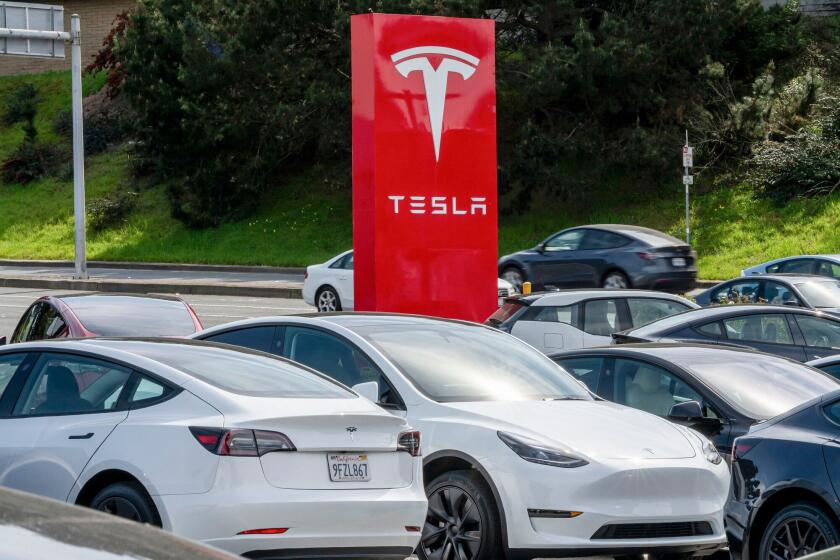Jeep takes new path with diesel 2014 Grand Cherokee
- Share via
This is not your grandfather’s Jeep.
The 2014 diesel Grand Cherokee Summit points the brand in a very different direction than its beginnings as a bare-bones World War II gadabout. The same can be said for this new version’s $57,000 price tag.
Today’s Jeep comes with trinkets that were beyond fantasy in the 1940s, including adaptive cruise control, heated and cooled leather seats and an adjustable air suspension. The hope is that goodies like these will draw buyers out of sport utility vehicles from established German luxury brands and establish Jeep as a competitor in the cut-throat, $50,000-plus arena.
“Once you hit that level, the market shrinks significantly,” Mike Manley, Jeep’s chief executive, said in an interview at the 2013 Los Angeles Auto Show. “It’s a tough market, but what we’ve seen with the [high-end Grand Cherokees] is that we can really compete there.”
Chrysler’s can-do brand also wants to grab some of those owners with the new diesel option on the Grand Cherokee, which Jeep refreshed for the 2014 model year. Mercedes-Benz, BMW, Volkswagen and Audi each sell at least one diesel SUV in the U.S.
To stay in league with this group, Jeep is positioning the diesel model as its most premium offering (not including the 470-horsepower, full-bonkers SRT model that sails past $70,000). This means you can spend as much as $59,000 on a diesel Grand Cherokee. The almost fully loaded diesel Summit we tested sells for $56,990.
In addition to the aforementioned goodies, the Summit model includes a panoramic sunroof, power liftgate, 8.4-inch touch-screen navigation and infotainment system, heated steering wheel, forward collision mitigation, backup camera and blind-spot monitoring.
Adding the diesel engine to the Summit model is a $5,000 option, and includes an upgrade to a four-wheel-drive system, a limited-slip differential, and heavy-duty ABS brakes and rear axle.
And let’s not forget the engine itself, a 3.0-liter V-6 pulled from duties in the European Grand Cherokee. With just 240 horsepower to move nearly 5,400 pounds, this Grand Cherokee can feel sluggish when you meet an onramp or passing situation. This fault isn’t limited to this Jeep diesel however; nearly all the German diesels it’s chasing have almost identical horsepower.
Another byproduct of driving this diesel is the noise. With all the clatter of your favorite school bus, sneak into your driveway at night you will not. However, after a week of testing we admittedly found ourselves used to the sound, and the tightly bolted interior does a great job of keeping this noise and others out.
Otherwise, the diesel model handled and drove like any other Grand Cherokee on the market. This is high praise, as you need only a few minutes behind the wheel to feel the excellence of the chassis, which this Jeep shares with the current generation of Mercedes ML SUV (a latent byproduct of the failed Daimler and Chrysler venture).
Also worthy of praise is the Grand Cherokee diesel’s best attribute: piles of torque — 420 pound-feet if we’re being scientific about it — that aids in initial acceleration and lets this SUV tow as much as 7,400 pounds.
A fuel-efficient eight-speed automatic transmission has been fitted to the entire Grand Cherokee family for 2014. In this model it stays out of the engine’s way, and was content to play a subtle role in reducing the SUV’s fuel intake.
The EPA rates this diesel version at 21 miles per gallon in the city and 28 mpg on the highway. We averaged 25 mpg during nearly all highway driving, which means around 600 miles on a single tank was possible.
This is another reason Manley and his team at Jeep were keen to bring this diesel stateside. Few modifications were needed to bring it into compliance with U.S. regulations, which means this is a relatively cheap way for Jeep to boost the brand’s fuel economy average.
While it’s unfortunate that Jeep customers have to part with so much cash for a capable and fuel-efficient diesel engine, Jeep hasn’t ruled out making it available on lesser Grand Cherokees or different models entirely.
“I think [high-end models] are going to be a proxy to what else we can do with diesel,” Manley said. “This is like a litmus test for us.”
Jeep is considering the diesel on the base Laredo trim that is so popular among customers who lease. Currently, the cheapest diesel Grand Cherokee costs at least $41,590. Jeep may also bring to the U.S. the diesel version of the all-new compact Cherokee that recently went on sale. That model is available with a diesel engine in Europe, and Jeep would again position it at the high-end.
Such a strategy is not without its downsides. The Grand Cherokee diesel’s biggest flaw is the interior’s lack of overall refinement. That’s not to say this is an unpleasant or uncomfortable vehicle. But buyers getting out of a similar BMW or Mercedes will certainly notice the inside of this Jeep is a little lower rent than they’re used to.
Consider this collateral damage. A base Grand Cherokee — which has the same basic interior — isn’t aimed at the luxury crowd and starts at tens of thousands of dollars less than anything with a German emblem on the hood.
This is why Jeep is looking forward to the future, which includes a deep dive into luxury waters. Not only did Manley say that an even more robust Grand Cherokee model could be possible in the future, but also that the company has plans to launch an all-new SUV in 2016 or 2017.
That model would resurrect the Grand Wagoneer nameplate, and probably would target SUVs with three rows of seats such as the Mercedes GL, Infiniti QX60, Lexus GX and Audi Q7. This true-luxury model would avoid Grand Cherokee’s challenge of seeking both high-end refinement and everyday cost effectiveness.
“I would like to see a Grand Wagoneer compete at the true top end against other luxury three rows,” Manley said. “For me that’s an exciting opportunity. I do think we can go further.”
Don’t rule out Jeep on that one. Going further is something the brand has always been good at. Starting with your grandfather’s Jeep.
david.undercoffler@latimes.com
More to Read
Inside the business of entertainment
The Wide Shot brings you news, analysis and insights on everything from streaming wars to production — and what it all means for the future.
You may occasionally receive promotional content from the Los Angeles Times.









